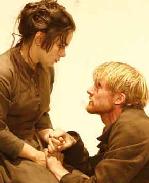SITE GUIDE
SEARCH
REVIEWS
REVIEW ARCHIVES
ADVERTISING AT CURTAINUP
FEATURES
NEWS
Etcetera and
Short Term Listings
LISTINGS
Broadway
Off-Broadway
NYC Restaurants
BOOKS and CDs
OTHER PLACES
Berkshires
London
California
New Jersey
DC
Philadelphia
Elsewhere
QUOTES
TKTS
PLAYWRIGHTS' ALBUMS
LETTERS TO EDITOR
FILM
LINKS
MISCELLANEOUS
Free Updates
Masthead
Writing for Us
A CurtainUp Review
Crime and Punishment
|
It's remarkable, in fact, that the great majority
of great men were also responsible for great
carnage in their day. Even men who are only
a little out of ordinary must be criminals by
their very nature. Otherwise, they never rise
above the masses, and they can't stand being
part of the masses.
.— Raskolnikov
|

Susan Bennett and Scott
Parkinson in Crime and Punishment
(Photo: Carol Rosegg) |
Writers' Theatre's production, now part of the Go! Chicago Festival at 59E59 Theaters, would be excellent if only for Marilyn Campbell and Cart Columbus's brilliant script, which distills Dostoyevsky's language into pure poetry. But the production is also blessed with director Michael Halberstam's extraordinary staging, which creates an electrifying visualization of the chaotic inner and outer worlds of Dostoyevsky's protagonist, Rodion Raskolnikov. Add in the high quality of the acting and this Crime and Punishment is a play not to be missed.
Scott Parkinson plays Raskolnikov with great sensitivity and a breathtaking dramatic range. Raskolnikov is an intellectual who has come up with the less than original theory claiming that certain people are so special they are not limited by the common law. Thus he becomes a murderer who can only be redeemed by God and love.
The play demands that Raskolnikov lurch between past and present, guilt and terror. Towards the end of the play Parkinson's Raskolnikov has a long monologue in which he tries to justify the murder to the audience and to himself. This calls for an extraordinary performance, and Parkinson is every bit the actor this play needs.
Susan Bennett plays all the female roles: Sonia, the compassionate and self-sacrificing prostitute; Alyona Ivanova, the old moneylender, and Lizaveta, her kindly sister, both Raskolnikov's victims; as well as Raskolnikov's indulgent mother. Some of her roles are in direct opposition to each other: the otherworldly Sonia and the money-hungry Alyona, for instance.
John Judd portrays all the male characters: Profiry the police inspector who believes in "free form" investigation because "You never know what's going to lead you to an answer"; Marmeladov, Sonia's drunken and pitiful father; the Tradesman, who appears as Raskolnikov's conscience; Koch, another client of Alyona.
Judd's primary role as Profiry is particularly nuanced. It embodies the good and bad cop in one personality, both of which appear unexpectedly like Dr. Jekyll and Mr. Hyde. One minute he calls Raskolnikov "dear boy," the next he is asking the most leading questions.
Judd and Bennett merely throw on a hat or a coat to differentiate a new character, with the effect that they are always their primary characters, with Profiry and Sonia, playing the secondary characters. While in some plays such doubling and tripling up is clearly a money-saving device, in Crime and Punishment it serves to further demonstrate Raskolnikov's confused state. Fortunately, both actors are so skillful there is never any question of whom they are portraying and what his or her role is in the drama.
What is past? What is present? What is real? What is imagined? Scenic designer Eugene Lee's unpleasant, almost bare white stage, with its many doors leading offstage and dominated by the suspended figure of Christ on his cross, becomes a blank canvass for Raskolnikov's inner turmoil. At moments of greatest frenzy, Josh Schmidt's sound design conveys Raskolnikov's feverish state almost better than words. As doors open and shut, new characters appear. The lights go on and off and frightful sounds are produced by the flick of a giant circuit breaker.
This is fine drama. It is also pure Dostoyevsky. From its opening line, "Do you believe in Lazarus, rising from the dead?" to its life-affirming but inconclusive answer to that question, Crime and Punishment is riveting and not easily forgotten.
| CRIME AND PUNISHMENT By Marilyn Campbell and Curt Columbus Based on the novel by Fyodor Dostoevsky Directed by Michael Halberstam Cast: Scott Parkinson (Raskolnikov), John Judd (Porfiry Petrovich), Susan Bennett (Sonia). Scenic Design: Eugene Lee Costume Design: Theresa Squire Lighting Design: Keith Parham Sound Design: Josh Schmidt 59E50 Theaters with Writers' Theatre at 59 East 59th Street (between Park and Madison) 212/279-4200, www.59e59.org From 11/1/07, opening 11/7/07, closing 12/207 Tickets: $35, $24.50 for 59E59 members Tuesday through Friday 8:15 PM; Saturday 2:15 PM and 8:15 PM; and Sunday 3:15 PM and 7:15 PM Reviewed November 6 press preview by Paulanne Simmons |
Try onlineseats.com for great seats to
Wicked
Jersey Boys
The Little Mermaid
Lion King
Shrek The Musical

The Playbill Broadway YearBook

Leonard Maltin's 2007 Movie Guide


Wicked
Jersey Boys
The Little Mermaid
Lion King
Shrek The Musical

The Playbill Broadway YearBook

Leonard Maltin's 2007 Movie Guide


